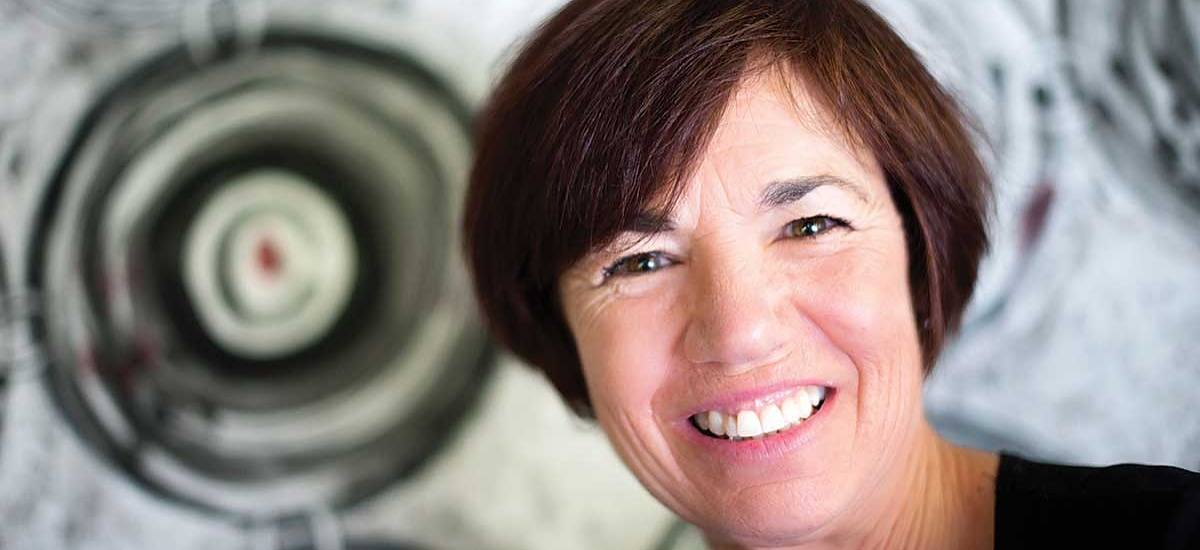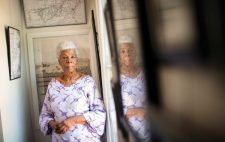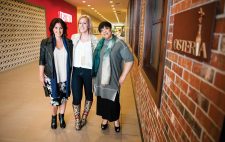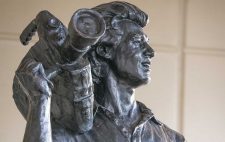The days of closed adoptions – usually when a troubled mother was secretly hushed and advised to forget her baby – have become a taboo part of the past. Today, adoptive parents typically promise to keep lines of communication open with the birth parents. But for adults who were adopted decades ago, obtaining their birth records, including a birth certificate, has been nearly impossible, because those records were sealed by law. However, new legislation being passed in states across the country is helping adoptees in their quest. New Jersey is the latest to provide adopted adults open access to once-sealed records.
When Collingswood resident Martha Gelarden gave up her newborn son for adoption 39 years ago, she was advised to return to her old life as if nothing had happened.
“I was told, when I relinquished my son, that I was not allowed to search for him, even though I don’t remember signing any papers,” says Gelarden, who was then a 20-year-old unwed art student. “There were a lot of things I didn’t think about for years. But did I forget my son? Absolutely not. That’s not something you ever forget.”
Like many mothers who gave up children, Gelarden lived with the secret, never challenging the notion that sealed adoption records were in everyone’s best interest.
 But times have changed. In an age when genealogy is a popular hobby, and the vast majority of modern adoptions include open contact between both sets of parents, providing adult adoptees access to records sealed long ago has become a civil rights issue. The New Jersey Coalition for Adoption Reform and Education (NJCARES) argues that New Jersey-born adoptees have been denied the right to know the truth of their origins for more than 70 years, since secrecy in adoption became the standard. In addition, adoptees cannot receive a copy of their original birth certificate – considered a starting point to learning one’s genealogical and medical history – without going through the cumbersome process of obtaining a court order.
But times have changed. In an age when genealogy is a popular hobby, and the vast majority of modern adoptions include open contact between both sets of parents, providing adult adoptees access to records sealed long ago has become a civil rights issue. The New Jersey Coalition for Adoption Reform and Education (NJCARES) argues that New Jersey-born adoptees have been denied the right to know the truth of their origins for more than 70 years, since secrecy in adoption became the standard. In addition, adoptees cannot receive a copy of their original birth certificate – considered a starting point to learning one’s genealogical and medical history – without going through the cumbersome process of obtaining a court order.
When New Jersey approved landmark adoption-reform legislation earlier this year, it joined the growing number of states from Maine to Oregon that have opened records within the past 15 years. The new law, which will give adult adoptees access to their original birth certificate starting in 2017, was intended to strike a balance between the rights of the adoptees and parents – both the birth and adoptive sets – many of whom were guaranteed privacy by adoption agencies and may still wish to remain anonymous. A two-year waiting period allows biological mothers – termed “original” mothers among adoption birthright advocates – time to conceal their names if they choose.
Yet the unsealing of records remains controversial. Lobbyists, including the New Jersey Catholic Conference, have argued that unfettered access to birth records breaks promises made to protect parties involved in adoption. For some women, who gave up children in an era when words like “bastard” and “unwed mother” packed very real punches, the prospect of being contacted by a child given up long ago could open old wounds and cause new trauma, says Patrick Brannigan, executive director of the New Jersey Catholic Conference. So far, these women have not been willing to step forward and publicly tell their stories.
“Some reunions can be very successful,” says Brannigan. “But some can be horrible and painful.”
Even now, in an age when women have far greater access to birth control and the definition of family has expanded, eliminating the possibility of a discreet adoption could have serious repercussions, argues Marie Tasy, executive director of New Jersey Right to Life, the largest anti-abortion group in the state.
“If a woman in crisis desires privacy, the only option now available to her would be abortion or abandoning her baby,” says Tasy, who opposes the new law.
In response, adoption reform advocates point out that no research supports the notion that confidentiality plays a role in the decision to terminate a pregnancy. Studies show abortion rates in states offering access to birth records are consistently lower than in New Jersey. In a 2003 national survey of 1,900 women who had abortions, not one cited the inability to choose a confidential adoption as a factor in the decision, according to the Guttmacher Institute, a nonprofit involved in reproduction and health rights.
Moreover, polls of birth mothers consistently indicate the vast majority would welcome contact with the children they gave up. And in states with laws like New Jersey’s measure, in which birth mothers are given the opportunity to redact their name from birth certificates, very few chose to remain anonymous. In Illinois, for instance, of more than 10,000 original birth certificates issued since 2010, only 53 were redacted at the biological parents’ request.
Although the issue of the rights of adopted adults remains a hot button, particularly in states like Pennsylvania and New York, where activists are still in the process of challenging sealed records, modern adoptions are far different and less secretive than those of the past, says Rutgers School of Law Professor Kimberly Mutcherson.
They are also far less common. The number of never-married women who place their children up for adoption has hovered around 1 percent and been statistically zero for black, never-married women for the past 20 years, according to the Center for American Progress.
Societal changes, including the acceptance of single parenthood, has made it far more common for unmarried women to keep their children, while assisted reproductive technology has given couples more options to pursue parenthood. In addition, the vast majority of modern adoptions now involve open communication and even relationships between birth and adoptive parents, says Mutcherson.
“Domestically, it really is a different landscape than it was even 20 years ago,” says Mutcherson, whose scholarly work focuses on health, bioethics and family law.
“Some data suggests that almost 100 percent of private-placement, domestic adoptions are open adoptions at this point, so most of this stuff has already been worked out with kids being born today. What is left now, what’s working its way through the [legal] pipeline, are rights for older people who had a really different experience with adoption.”
While many adoptees see the act of discovering their history and contacting their original parents as a right to discover who they are, others have a more urgent need.
For the late Susan Perry of Cherry Hill, access to her birth records might have saved her life. Her story – which includes a diagnosis of melanoma, an original mother who did not want personal contact, and the eventual discovery of half-sisters who became cherished friends before her passing in April – is a compelling argument for opening records, say family members.
“Her personal case shows everything the opposition is saying to be false,” says Perry’s daughter, Jenn Gentlesk, 37. “Her mom was one of those 1 percent of people who didn’t want to be contacted yet wasn’t hurt when she was. And my mom’s medical history, had she known it, could have made a difference.”
Perry, born in 1950, did not feel compelled to search for her biological mother until she was diagnosed with melanoma some 17 years ago. With no access to her medical history, she had no idea if the cancer ran in her family.
Years later, with the cancer in remission, Perry hired a private investigator to locate her birth mother on the insistence of her daughter Kate Penberthy, a doctor. Although her birth mother declined to be contacted, she was willing to fill out a medical questionnaire. That was when Perry finally learned about a family history of melanoma, says Gentlesk.
Although Perry respected the wishes of her birth mother, the experience changed her. As an activist with NJCARES, she sometimes took her two adult daughters along for moral support when she lobbied lawmakers.
“That’s when I realized how hard this was,” says Gentlesk, a Haddon Heights mother of three who continues to update her mother’s blog on adoption issues, nanadays.blogspot.com. “She had to tell the most personal story, and she was really talked down to. She was treated like a little child.”
Last year, when Perry discovered a small lump on her leg that turned out to be aggressive stage IV melanoma, she felt an even greater need to discover more about her family history. Finding an obituary online led her to a reunion with two half-sisters she never knew about until months before her death.
“The first time they visited, they came with boxes of pictures and sat here all day,” recalls Perry’s husband Tyson. “We were all very lucky that her sisters were the warmest, most generous people you can imagine. We just wished they had been part of our lives sooner.”
While the practice of adoption – children transferred from birth parents to other adults – has been around since prehistoric times, it wasn’t until the Massachusetts Adoption of Children Act of 1851 that such exchanges were formalized, according to the University of Oregon’s National Adoption Project (NAP).
Other states followed, typically establishing laws meant to protect all parties and establishing that adults and children be vetted and transactions kept confidential. These measures, however, still allowed for adoptees to obtain copies of their birth certificates and adoption-related papers as adults, according to the NAP. Most agencies acted as passive registries through which separated relatives could locate one another.
But by World War II, as society confronted more out-of-wedlock births among middle-class families, adoption was recast as “the best solution” for the children, unmarried mothers and infertile couples. Maternity homes proliferated, hiding non-marital pregnancies from public view. Meanwhile, new laws converted confidentiality to secrecy. Most states, including New Jersey in 1940, started sealing original birth certificates, instead issuing new ones that concealed information.
Secrecy meant that even as adults, adoptees could not obtain information about their births and backgrounds without a court order, leaving the decision whether or not to release the information to a judge. Plus, most agencies charge hundreds of dollars to find and contact parties interested in connecting. And often, adoptees will hire their own private investigators, use Facebook or “search angels” – volunteers who will help adoptees seek out their kin without charge.
Not surprisingly, adoption reached its height in the days before Roe v. Wade, the 1973 Supreme Court case that legalized abortion. In 1970, 175,000 adoptions were finalized, according to the NAP.
The birth of the adoption rights movement correlated with other civil rights awakenings. The first advocacy group, The Adoptees’ Liberty Movement Association, formed in 1971, labeling sealed records “an affront to human dignity.” In New Jersey, advocates have been pressing lawmakers for reform since 1980. State Sen. Diane Allen (R-Burlington) took up the cause in the Senate 17 years ago.
“I was flabbergasted when I listened to what these people had to say,” recalls Allen. “I very definitely came to the conclusion that people who are adopted are treated like second-class citizens.”
Despite the compelling stories, how-ever, the side arguing for privacy was influential and surprisingly diverse. It included the Christian Coalition, which represents numerous adoption agencies statewide, the American Civil Liberties Union, the New Jersey State Bar Association and New Jersey Right to Life.
Some years the bill would be approved by the state Assembly and die out without Senate support; other years the support would be in the Senate and not the Assembly. Yet as more states passed legislation opening records, it became easier to convince New Jersey lawmakers to do the same, Allen says. Three years ago, an adoptees’ bill of rights sailed through both legislative bodies only to be conditionally vetoed by Gov. Chris Christie.
Christie required that birth parents’ names be redacted from birth certificates and provisions be added for biological parents to request not to be contacted by their adopted children. He also insisted that confidential intermediaries continue to facilitate contact. NJCARES considered the conditions unacceptable.
This legislative session, however, Christie eased his restrictions when the bill came before him. Noting that his fact-finding included seeking the opinion of his adopted sister Dawn, Christie proposed a compromise law that included the two-year wait to give birth parents a chance to redact their names from the birth certificate. It also gives birth parents the option to submit a preference for how they wish to be contacted.
A birth parent who requests no contact will be encouraged to provide the health department with updated family information every 10 years until age 40 and once every five years after that.
Mutcherson, the Rutgers law professor, commended Christie for striking a good compromise, even if both sides aren’t completely happy.
“It took tremendous good will on both sides to come up with something that’s good for adult adoptees and also for folks who many, many years ago made a decision or were forced into a decision to remain anonymous and went on with their lives,” she says. “It was important to take them into account.”
For Collingswood’s Gelarden, an artist who became an activist with NJCARES after frustrating experiences helping her son Adam obtain his birth records, the compromise is only a partial victory.
For her, the veil of secrecy was lifted five years ago when Adam contacted her in search of his medical history. When she became pregnant during her college break, Gelarden did what was expected of her: she found a job at a Catholic hospital in Illinois, away from anyone she knew, for the duration of her pregnancy. After delivering her son, she held him for an hour before he was taken away. Then she went on with her life.
Although she never went looking for him, she always hoped he would someday reach out to her. And despite being married twice, Gelarden never changed her name, hoping to make the search easy. It wasn’t.
Like New Jersey, Illinois still sealed birth records when her son set out to find her in 2009. After registering with the state’s adoption agency, he had to pay hundreds of dollars to the agency to search for his mother and send her a letter. Then mother and son were required to communicate through an intermediary.
After their eventual reunion, Gelarden registered with the state of Illinois, confirming she was his birth mother. Months later, Adam finally received his birth certificate.
A year later, Illinois became the largest state in the nation to give adult adoptees access to their birth certificates.
“Quite honestly, I never wanted and still don’t want any other family to go through what my son and I were put through,” she says, noting that she and Adam have collaborated on mixed-media art works relating to the theme of adoption. “Adoptees and their original parents talk about a void they feel, like something is missing. When my son and I connected, there was a sense of completeness I never experienced in my life.”












